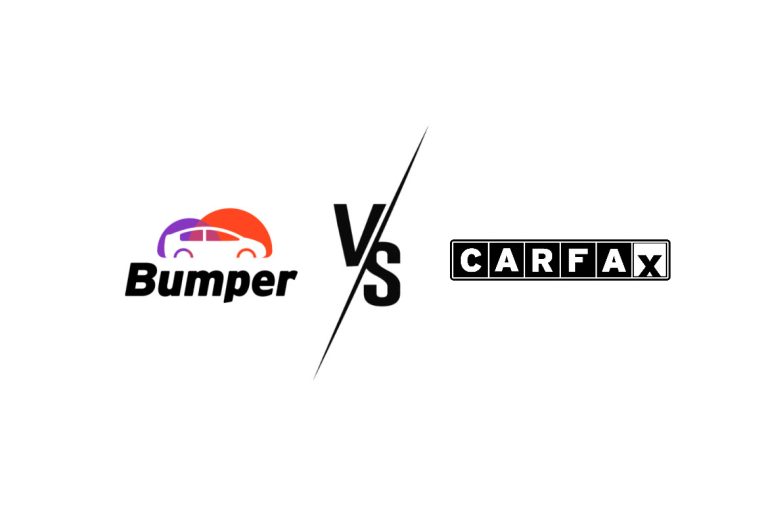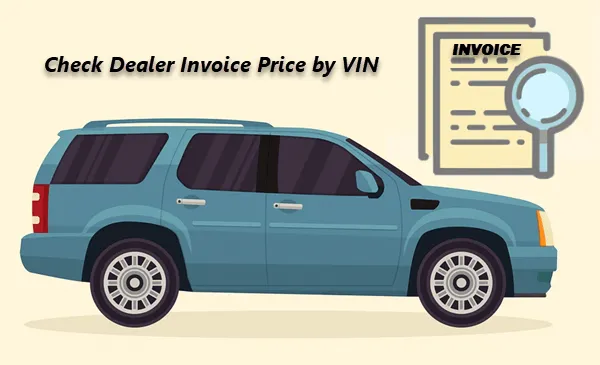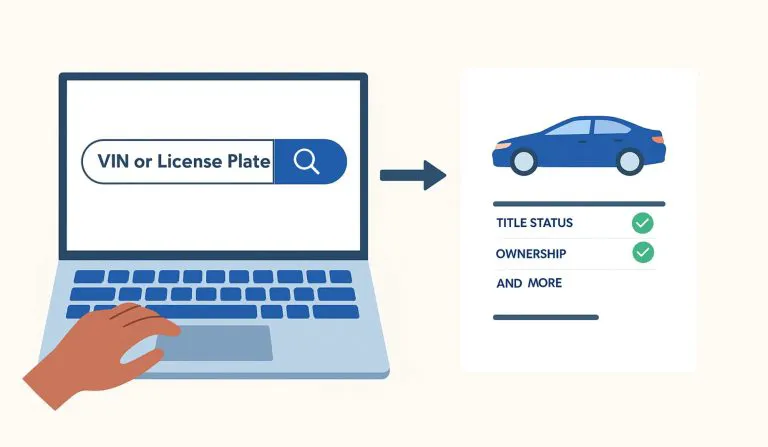How to Find Vehicle Title Number and Check Title History
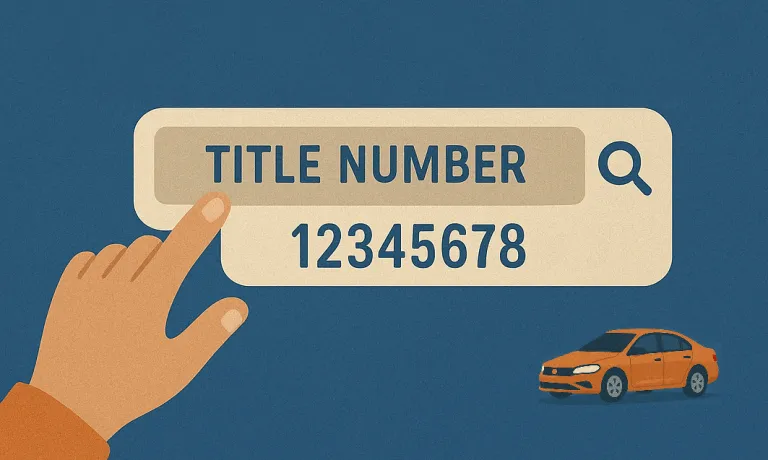
When you’re dealing with vehicle paperwork, the title number is often easy to overlook. It’s used to identify the certificate of title, a legal document that proves a vehicle’s ownership. You might need it when renewing the registration, applying for a duplicate registration card, or transferring ownership. In this article, we’ll show you where to find the title number, even if you don’t have the paperwork, and how to check a vehicle’s title history easily.
TL;DR
- You can find the title number on documents like the title, registration card, or loan papers (for leased or financed cars).
- Many states’ DMVs provide online portals where you can check a vehicle’s title number and status using its VIN.
- If you’re buying a used car and want to dig into its background, an in-depth search is recommended. It will uncover the vehicle’s complete title history across states, ownership, liens, and more.
What is the title number?
A vehicle title, or known as a pink slip, is an official document that proves who legally owns a vehicle. The title number serves as a unique identifier for the title and is used by the DMV to track that specific document in its systems.
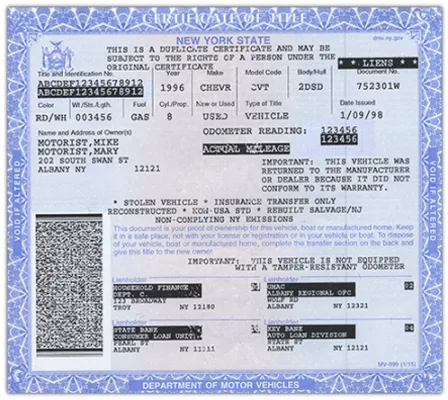
The length of the title varies by state, ranging from 7 to 17 characters long (most commonly 7 – 8 digits). While you won’t need it every day, it may be required for certain tasks like registration renewal or replacement, or ownership transfers.
Is the title number the same as the VIN number?
It’s a common mix-up, but no, the title number and the VIN (Vehicle Identification Number) are completely different.
VIN is a 17-digit unique code assigned to a vehicle by the manufacturer. It’s permanently tied to a vehicle’s identity and history, telling you where and when the car was built, who made it, as well as what it’s been through over time.
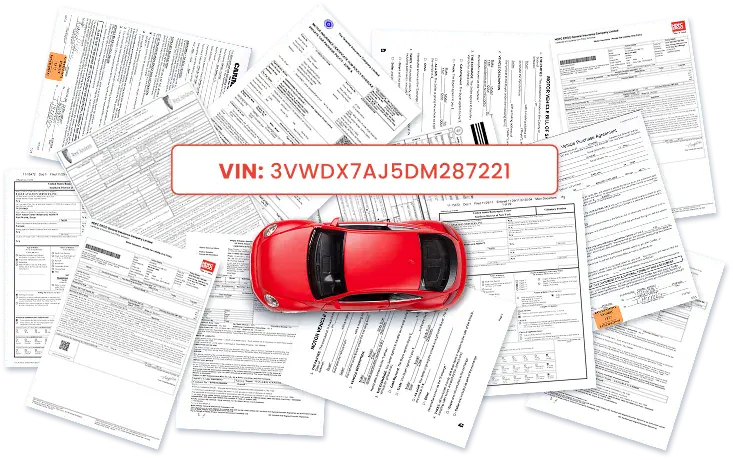
Read more: What is VIN, How to Decode a VIN & Run a VIN Lookup
The title number, on the other hand, is issued by the state DMV (Department of Motor Vehicles) to identify the vehicle’s certificate of title. Unlike VIN, the title number will change when the vehicle is retitled in a different state or sold to a new owner.
Despite their differences, the VIN and title number are closely linked. If you want to look up a vehicle’s title number or check its title history, you’ll typically need the VIN to start the search. VIN is a vehicle’s core ID that connects all major events throughout its life.
How to find the vehicle title number
Check the paperwork
The most direct way is to look at the vehicle title. The title number (a numeric or alpha-numeric string) should be printed clearly, usually at the top of the document. Look for terms like “title number”, “document number”, or “control number”.
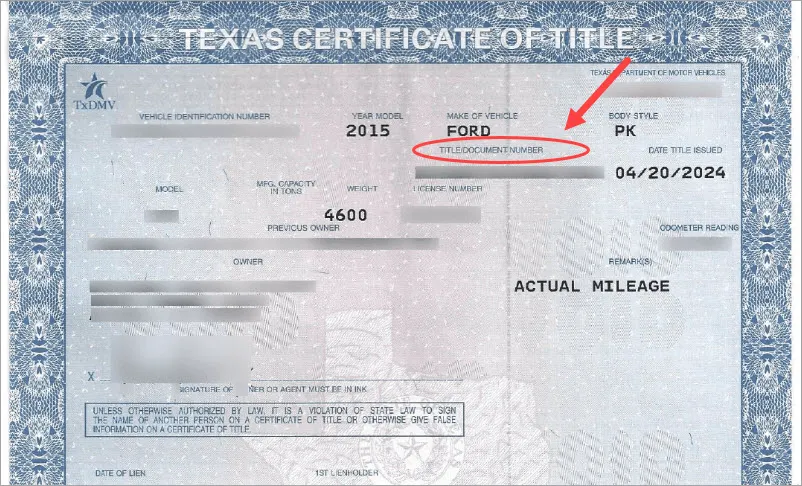
No title on hand? Check the vehicle registration card. In many states, the title number is also listed on your registration card or renewal notice.

Title numbers vary by state in length and placement on documents. Refer to the chart below for details.
| State | Length | Where to find it on the title | On registration card? |
|---|---|---|---|
| CA | No distinct title number; use issue date (YYYYMMDD) | Use Issue Date | No |
| TX | 17 digits | Under “Title/Document Number” | No |
| FL | 8 digits | Top right | Yes |
| OH | 10 digits | Top right (Under No.) | No |
| PA | 11 digits | Top right | Yes |
| IL | 11 digits | Top right | No |
| GA | 15 digits | Top right | Yes |
| NC | 15 digits | Top left | Yes |
| VA | 8 digits | Top right | Yes |
| NY | 7 digits | Top right (Under Document No.) | No |
If you’re still paying off the car, the lender likely holds the title, but your loan paperwork might reference the title number.
Search through the local DMV
If you don’t have access to paperwork, the local DMV may be able to help. Many states now offer electronic databases for looking up vehicle titles or information.
The exact process varies. Some states let you search by VIN directly, while others may require you to log in with your driver’s license number, SSN, or other personal information.
Below are some states with portals for checking vehicle title details.
Not sure whether your state offers a lookup tool? Just search “state + vehicle title check’ on Google and look for the official .gov website.
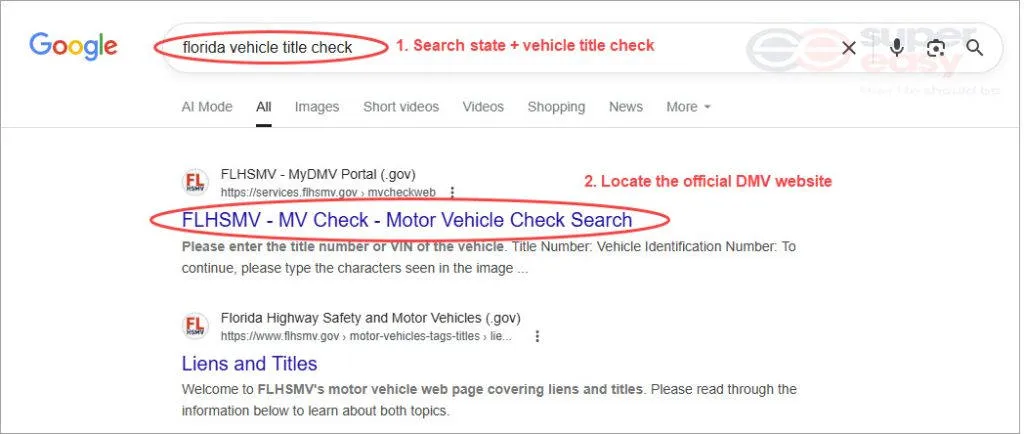
Let’s take Florida as an example, whose system is among the most detailed. Head to its website, enter the VIN, and you’ll find a range of vehicle information. That contains the vehicle’s make, model year, title status, title number, odometer readings, number of owners, plus information on lien, title brands, and crash.
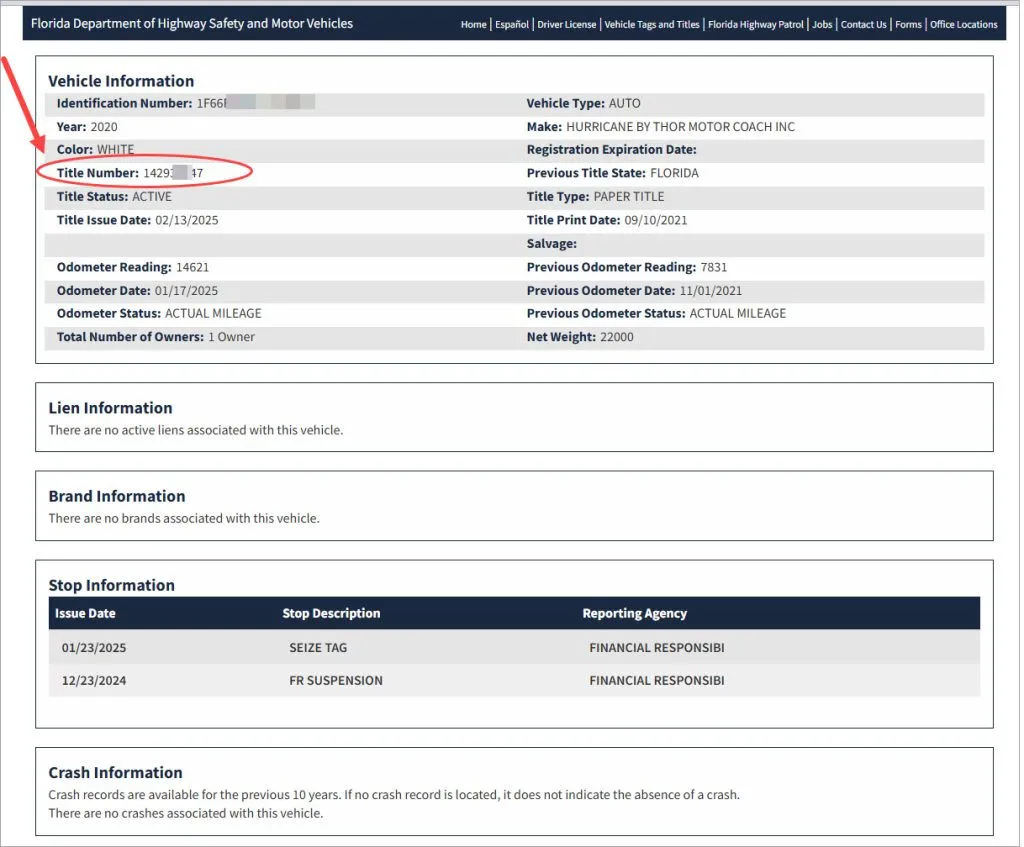
Tips: If the results show the previous title state, go further by checking through that state’s DMV. You may gain more insights into the vehicle’s title history across different states.
However, not every state goes that deep. While Florida offers detailed info online, some states, like New York State, only show basic data, such as the title issue date or lien count, and might not display the full title number or much vehicle-related information.
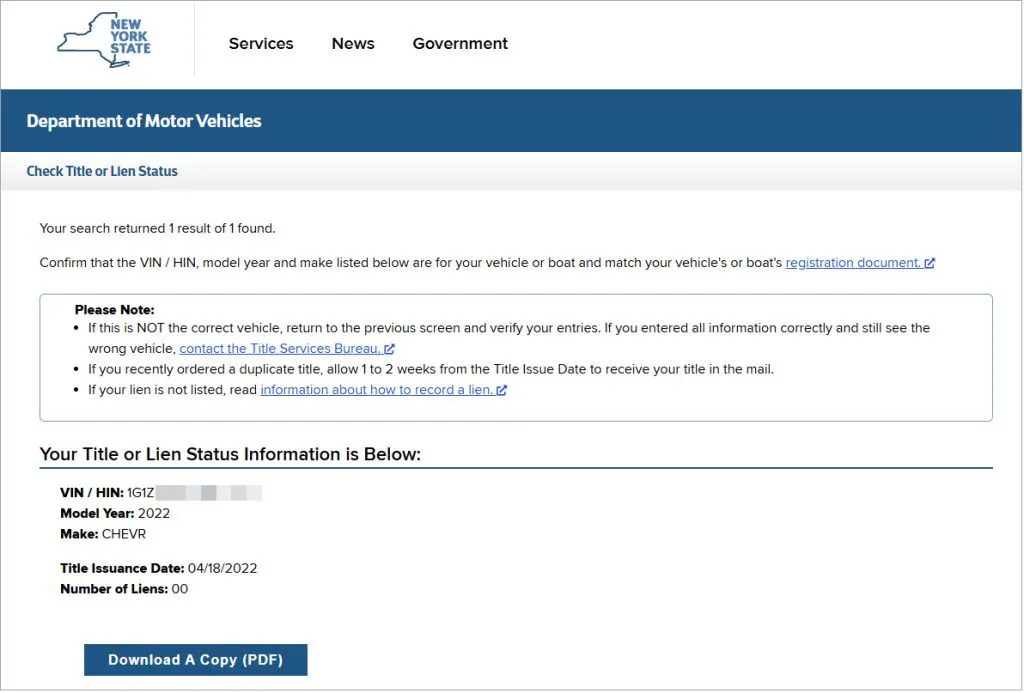
If the state (e.g., Texas, Pennsylvania, and Virginia) doesn’t have an online search portal, or if you can’t find the title number through it, try contacting the DMV. You can call or email them to ask how to obtain the title number, or request a title copy that includes the number. 👉 Find your state’s motor vehicle service.
Dig deeper – Explore a vehicle’s title history
If you’re checking the title to verify ownership, dig into both current and previous titles, or uncover possible red flags before buying a used car, a full vehicle history report is far more helpful than just a title number. And the key to unlocking it is the VIN.
Bumper and VinAudit are two reliable vehicle history report providers. They’re both approved sources of NMVTIS (National Motor Vehicle Title Information System) data, the only federal database in the U.S. that collects information from state DMVs, insurers, junk yards, and salvage auctions.
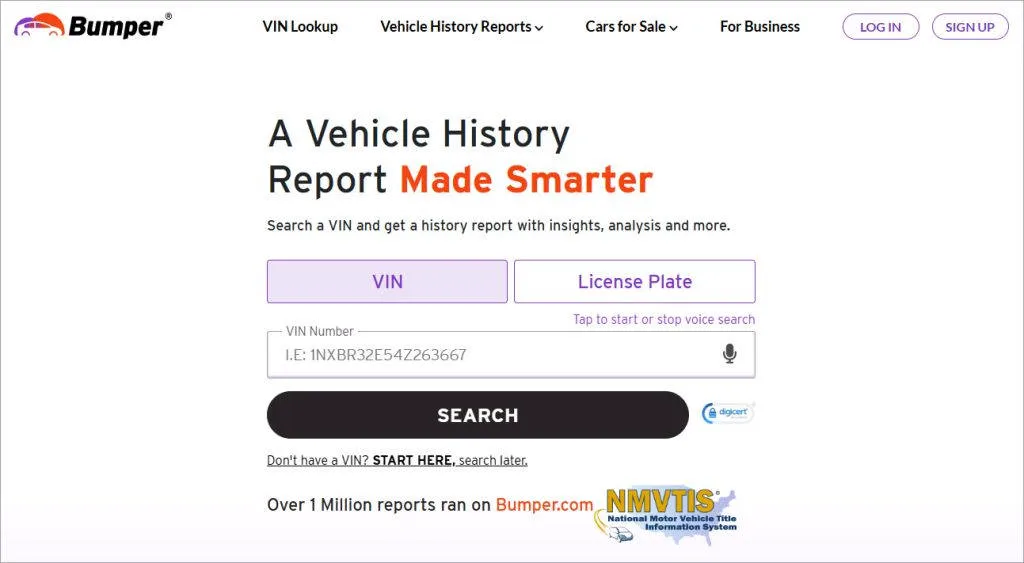
Just enter a VIN into the tool, and you can instantly check title-related records across states, including:
- Title issue dates and states
- Title branding
Read more: Common title brands and what they mean - Mileage
- Lien or loan records
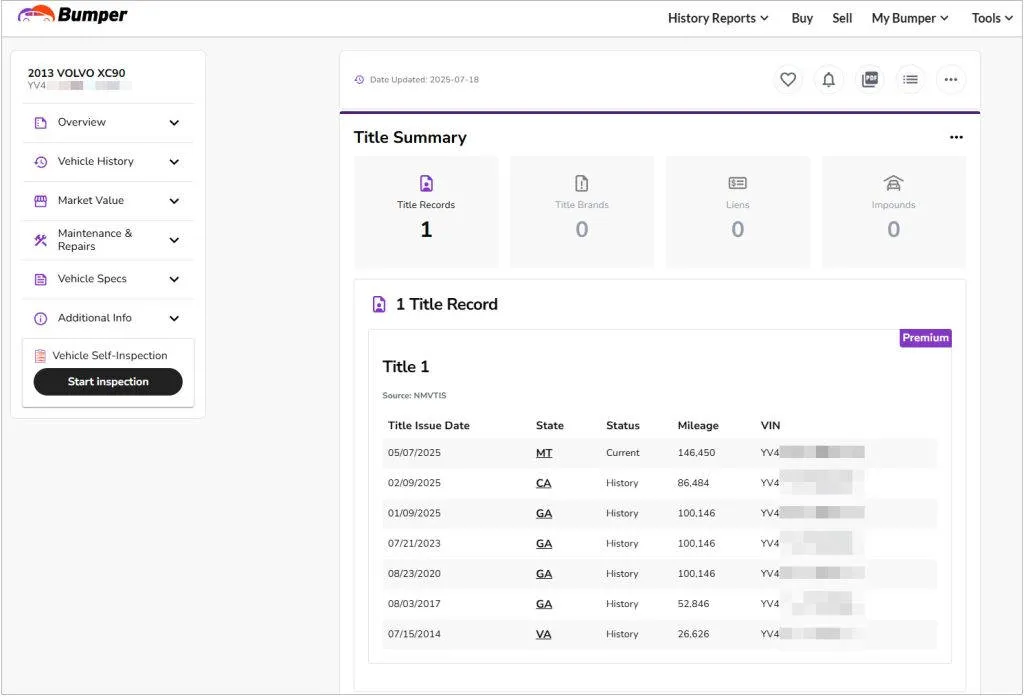
Furthermore, their reports include extra insights to help you make a smarter decision, such as:
- Ownership history (how many owners, when, where, and how much the vehicle was purchased for)
- Damage and accident history*
- Service and repair records
- Auction and sales listings (when and where the vehicle was listed or sold)
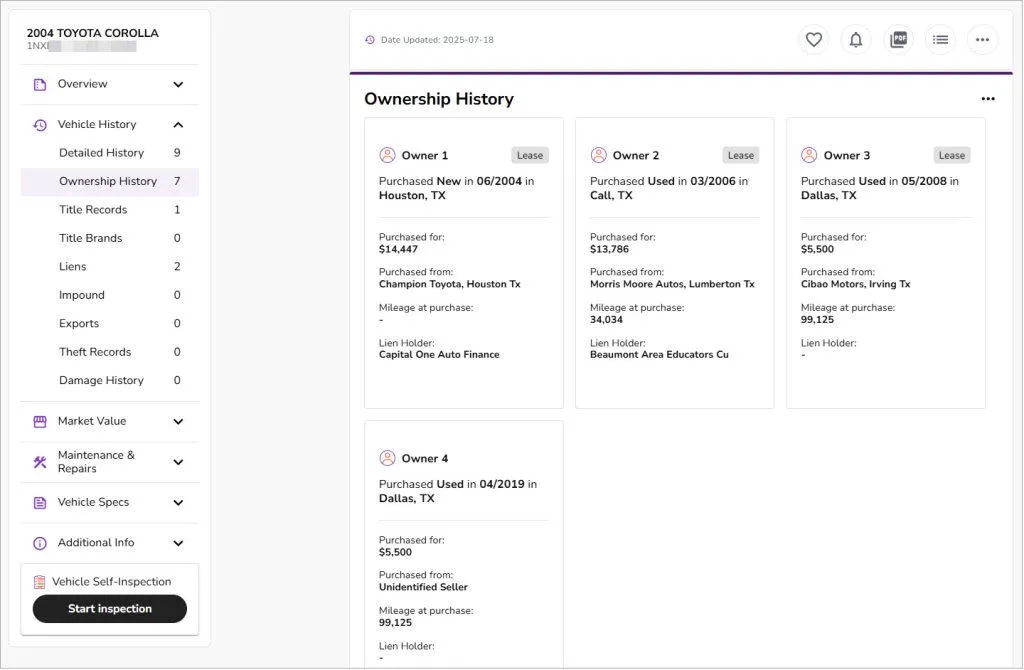
* Bumper reports are based on data available and may not include historical accident records in all states.
Why it’s important to check a vehicle’s complete title history
While you can check a vehicle’s current title status through the local DMV, this only shows what happened in that state. States handle titles in their own way, and that can create loopholes. A car might appear to have a clean title in one place while hiding a problematic history elsewhere. That’s why a complete, nationwide title history is crucial, which can help you:
- Spot title washing.
Some unscrupulous sellers move cars across state lines to “wash” away branded titles, like salvage, lemon, or flood. You may not spot these red flags unless you check nationally. - Catch odometer rollbacks.
Mileage tampering often happens during title transfers. Without seeing the complete history, you might miss suspicious mileage jumps. - View a complete title timeline across multiple states.
You can check where the vehicle has been titled, and when. A few out-of-state moves can be normal, but frequent transfers, especially with changing title brands, should be a cause for concern.
FAQs
What to do if your title or registration card is lost?
If you’ve lost your vehicle title or registration card, you can request a replacement from your state’s DMV online, by mail, or in person. You’ll likely need the VIN, license plate, driver’s license, and your ID. And also the title number? Follow the methods above to find it.
How to find the registered owner of a vehicle?
Due to the Drive’s Privacy Protection Act (DPPA), personal owner information isn’t publicly available. But in certain permissible purposes, like vehicle thefts or legal matters, you can request this data through the DMV.
Records available may vary by state. California, for example, provides the current legal owner’s name and address, ownership history (three previous registered owners), and all vehicles owned by the person.
Alternatively, you can reach out to a licensed private investigator. They may be able to legally access DMV data in certain cases and often have specialized resources and expertise to assist with complex situations.
How to check if a vehicle has a clean title?
A clean title means the vehicle hasn’t been branded as salvage, flood-damaged, or rebuilt. You can check with the DMV where the car is registered, but for a more complete picture, run a national title check with an NMVTIS-approved data provider. Their reports will flag title brands from across all states.
How to find out if a car has a lien?
A lien means there’s still a loan or financing on the vehicle. You can check for liens by reviewing the title document itself, contacting the local DMV, or running a vehicle history report (recommended for nationwide lien data). For detailed instructions, refer to our article: How to Check If There Is a Lien on a Car by VIN.
⚠ Never buy a car with an active lien unless the seller provides proof it’s been cleared at the time of sale.


 View all of Brinksley Hong's posts.
View all of Brinksley Hong's posts.
